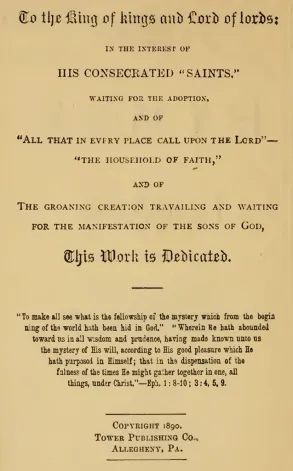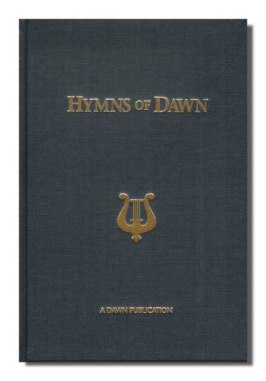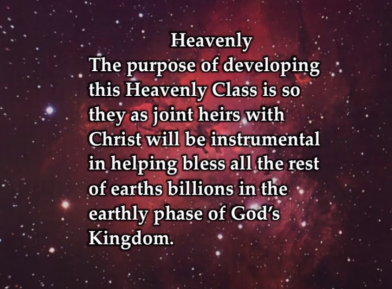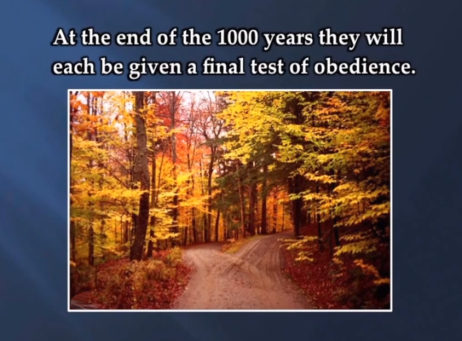
“For all things are yours; … And ye are Christ’s; and Christ is God’s.” 1 Corinthians 3:21,23
These have more enjoyment of the earth now than have others; while others are grasping, these are enjoying. As the apostle declares, God hath given “us richly all things to enjoy” (1 Timothy 6:17.) Freed from the grasping spirit, we can pass through the streets and observe the rich displays of the shop windows without covetousness, without wishing that we had the various works of art and beauty under our special care and control. We can feast our eyes upon them and be without the care of them at a time when all of our talents are consecrated to the LORD and His service, and when we have more important things to do than caring for earthly trinkets called works of art. R. 3734, c.2. p.4.
Reprint No. 3733-3737 of the Original Watchtower & Herald of Christ’s Presence
BLESSEDNESS SUPERIOR TO HAPPINESS.
“Blessed are the pure in heart: for they shall see God.” Matthew 5:1-16
HAPPINESS describes the joyful moods which come to mankind from time to time, but blessedness relates to that permanent joy and comfort which are the result of the attunement of character to harmony with the divine. The people of the world may at times be happy, and at other times downcast, mournful and troubled; but to those who become followers of the Lord Jesus, and who as pupils in the school of Christ are taught of him, there is a peace of God which passes all understanding ruling in their hearts, bringing comfort and rest even under most adverse outward conditions. The lesson we are now considering describes to us the condition of heart necessary to the possession of the peace of God. In proportion as we get before our mental eyes the true conception and then strive to attain that ideal, in the same proportion will be the degree or progress of blessedness which will come into our hearts and lives to rule there and to keep us in the love of God.
Our Lord and his disciples were on an elevated plane of the mountain side, and crowds of people were coming to hear the message of the great Teacher respecting the Kingdom so long anticipated and which he declared was nigh. His miracles had attested his divine authority as a Teacher, [R3733 : page 71] and this drew the people to him “who spake as never man spake.” (John 7:46) …
The teaching was addressed primarily to those nearest to the Lord, namely, his special disciples, the multitude interestedly watching for any items in the address that would specially enlighten them. It must have seemed strange to all the hearers that our Lord did not talk more about the Kingdom itself, explaining when and how it would be established, etc. But he knew that he must first suffer for the redemption of the world before the Kingdom could come and the divine will be done on earth as it is done in heaven. He knew, too, that the first work in preparing for the establishment of the Kingdom would be the gathering of the Church class, the elect, to be his Bride and joint-heir in the Kingdom. His discourse, therefore, was so directed as to divide the hearers into two classes—some would be disappointed because they were interested more in the glories and honors and dignities of the Kingdom hoped for than in the condition of heart necessary to a place in it. These probably went their way saying that doubtless Jesus was a great Teacher to those who liked his kind of philosophy, but to them it was a very dry and unsatisfactory portion.
Others, though disappointed in the character of the teaching, found something in it which satisfied their longings as nothing else could do—found in it nourishment, comfort, upbuilding qualities. The same is true today: some hear the good tidings of great joy with interest merely in those features which relate to restitution. They are glad to know that there is no eternal torment in the divine plan, but that, on the contrary, times of refreshing are coming to the world, and times of restitution of all things spoken by the mouth of all the holy prophets since the world began. (Acts 3:19-21.) But aside from this, all discussion respecting consecration to the Lord and terms of discipleship, all descriptions of characteristic conditions that would fit them for the Kingdom, are wearisome to them, distasteful. Thus does the Truth always separate.
“THE POOR IN SPIRIT”
The message of this great Teacher differed from all others, and was especially attractive to the humble, the lowly. Whereas others would have said, Blessed are the rich, the learned, the prominent, the rulers, this great Teacher reversed the matter, saying, “Blessed are the poor in spirit”—blessed are those who are not self-conceited, who do not think very highly of themselves, who appreciate their own littleness and imperfection. Astounding! How are such blessed? Surely the world thinks little of those who do not think much of themselves! Surely they will make less progress in the world! Ah, yes! But, says the Master, their blessedness consists in the fact that they are of the Kingdom—of those from whom the Kingdom of heaven class will be selected.
Self-confidence, self-esteem, may win for its possessor a high and honorable place in the present time, but is disesteemed of the Lord; and those who have such a spirit will be the less prepared for the tests and conditions which the Lord will impose in selecting the heirs of the Kingdom, the joint-heirs with Christ. Yes, indeed!—there is a favor and blessedness associated with being little in one’s own estimation: it preserves from many a false step into which egotism would lead. All who are seeking to follow the instructions of the great Teacher, who naturally are poor in spirit, humble-minded, deficient in self-esteem, have much advantage every way over others as respects this particular element of character. And those who are not naturally humble should take heed to the Master’s instruction, and humble themselves under the mighty hand of God, that they may be exalted in due time. (1 Pet. 5:6.) The Lord’s followers, then, should continually [R3734 : page 71] practise humility and be especially on guard against pride, self-conceit, etc.; they should know on the great Teacher’s authority through the Apostle that God resisteth the proud and shows his favor to the humble, the poor in spirit, to such an extent that only the humble will share with the Lord in the inheritance of the Kingdom.—1 Pet. 5:5; Jas. 4:6.
MOURNERS BLESSED AND COMFORTED
Again it seems strange, contrary to the usual thought, to say “Blessed are they that mourn.” The general thought is that those who mourn are to be specially commiserated. What principle lies behind the Master’s assurance that there is a blessedness connected with mourning? We reply that we cannot suppose that there is mourning in heaven—we must suppose that there is happiness, blessedness there. Hence the blessedness of mourning must in some way relate to our present imperfect, sinful conditions and surroundings. Sin is in the world, and death, the wages of sin, is being paid out to the entire human family, carrying into every home more or less disappointment, sorrow, trouble. Where these are appreciated rightly there must surely be mourning. The world is sick and dying; … he who is “merry” must surely be correspondingly irrational. Who but a foolish person could be merry in the shadow of such a charnel-house! Those who are merry under such conditions give evidence of so wrong a condition of heart and mind that we may know that they will require rigid disciplinary instructions (such as will be accorded to the majority of mankind during the Millennium) in order to bring them to their proper senses.
On the contrary, those who do mourn because of a realization of their own imperfections, their own fallen condition, and who to any extent mourn in sympathy with the poor, groaning creation, these have corresponding advantages because of their saner condition of mind; they will be the more ready for the heavenly message, telling of the glorious blessing that is to come through redemption in Jesus and through his Kingdom, which, as the rising of the Sun of Righteousness, shall bring in health, healing, life and comfort to all the families of the earth. Blessed are these mourners now, because they are in that much more favorable condition to hear the voice of him who speaketh from heaven—speaking peace through Jesus Christ our Lord. They shall be comforted. Their comfort shall not wait either until the new [R3734 : page 72] dispensation of the Kingdom shall be fully inaugurated and bring in the blessings of restitution: their comforting will begin at once, for their mourning will bring a readiness of mind to hearken for the Lord’s favor. So to these he will be pleased to make known something of the riches of his grace and lovingkindness through Jesus. They will have therefore the best opportunity for attaining the peace of God which passeth all understanding through the holy Spirit in this present time, and also in the dispensation to come.
Sorrow may be associated with sin and imperfection. It is proper that we should realize our fallen condition and be sorry for it, but this sorrow may be healed at once through the knowledge of the great redemption sacrifice and through our acceptance of a share in the merit of the same. But there is another sorrow or mourning which is not because of sin but because of sympathy. Our Lord, who was separate from sinners, had this spirit of mourning. It was this mourning in sympathy that led to his tears at the tomb of Lazarus, and the same that led to his being called “the man of sorrows and acquainted with grief.”—Isa. 53:3.
In our imperfect fallen condition, even after our hearts are fully consecrated to the Lord and imbued with his Spirit, it will not be possible for us to enter so fully into sympathy with others as did our dear Master; but we are to cultivate this spirit of sympathy, which is a part of the spirit of love, and the more we grow in grace and in character-likeness to the great Teacher the more we will have of the spirit of sympathy, the more sorrow and mourning will appeal to us.
On the other hand, however, the more we receive of this same holy Spirit proportionately we will have the greater peace, the greater joy in the Lord and the greater rejoicing, because of what we will be increasingly permitted to discern in the unfolding of the great plan of salvation under which all who mourn in Zion shall be comforted. So, then, the most advanced Christians, who have the deepest and most holy joy, should be the ones who at the same time would have the deepest sympathy with mourning and sorrow. Who has not already noticed this, that as our Lord and Teacher is the exemplar of perfection, so those who most nearly imitate him are usually such as have had deep experiences in the school of sorrow and mourning, and in whose hearts and characters deep spiritual lessons and characteristics have been engraved?
The word comfort does not contain the thought of relief, but rather that of strengthen together, or added strength. In other words, the Lord does not propose to take from us that noble quality of sympathy which we receive in the school of experience, but he does propose for all those who become his true followers that they shall be comforted or strengthened together, that he will give them a blessing of strength to endure, which will compensate their mourning and spirit of heaviness. He gives this through the promises of his Word and the glorious hopes which he sets before us, and he gives it also through the living epistles of the dear members of the household of faith. Note how the Apostle calls this to our attention in 2 Corinthians 1:4, where many times over he repeats the thought of our comforting one another with the comfort wherewith the Lord has already comforted us. Oh, what a privilege we enjoy, not only of being comforted by the Lord through his Word, but of being used of him as channels for comforting or strengthening or upholding one another during this mourning time, when some, more than others, have in themselves weaknesses and frailties to cause mourning to themselves and to others. Blessed are those who, being comforted themselves, shall be used of the Lord in the comforting of the other members of his body.
“BLESSED ARE THE MEEK”
The poor in spirit or humble minded, who do not think highly of themselves, are unquestionably the same as the meek, the gentle.
The Century Dictionary defines the word meek as “self-controlled and gentle; not easily provoked or irritated; forbearing under injury or annoyance.” Webster defines meekness as “submission to the divine will; patience and gentleness from moral and religious motives.” As we look about us in the world and note the meek of the earth we do not see them more prosperous than others, and our Lord’s words that such shall inherit the earth would astonish us and seem quite untrue if we did not understand that he referred to blessings beyond the present life. Surely the millionaires of earth, that own the larger portion of it and its riches, valleys and slopes, are very rarely to be counted as the meek. And so we see that the Master did not say, Blessed are the meek, for they do inherit the earth, but “they shall inherit the earth.”
When, Lord?
Answer: When God’s Kingdom shall come and his will be done on earth as it is done in heaven—then the meek shall inherit the earth. So, then, if we perceive that the rude, the unjust, the self-assertive, are grasping the bounties of earth in the present time, and if we find ourselves rather crowded out because of meekness, let us remember our Lord’s Word that we are especially blessed, and let us cultivate this quality of meekness more and more, and let us not think to exchange it for a spirit of arrogance and self-assertion and vindictiveness, to grasp earthly fame and name and riches. Let us rather be content to cultivate this spirit which the Lord assures us he approves, and let us wait for the time when this class shall inherit the earth. We perceive that the inheritance will be with a view to giving it to the human family under the terms and conditions instituted during the Millennial age. Then the meek of the restitution class will inherit the earth; they will be given the advantage everyway, and eventually all who are not meek will be utterly destroyed from amongst the people in the Second Death.
The meek ones of the Lord’s followers even now in a measure receive the fulfilment of this promise, as the Apostle declared, “All things are yours, for ye are Christ’s and Christ is God’s.” (1 Cor. 3:22,23.) These have more enjoyment of the earth now than have others; while others are grasping these are enjoying. As the Apostle declares, “God hath given us all things richly to enjoy.” (1 Tim. 6:17.) Freed from the grasping spirit, we can pass through the streets and observe the rich displays of the shop windows without covetousness, without wishing that we had the various works of art and beauty under our special care and control. We can feast our eyes upon them and be without the care of them at a time when all of our talents are consecrated to the Lord and his service, and when we have more important things to do than caring for earthly trinkets called works of art. [R3735 : page 73]
BLESSED THE HUNGRY AND THIRSTY
Our Lord refers to two of the most potent influences known amongst men. To what activity will not hunger and thirst spur us? Similarly there is in some a heart-hunger and thirst for that which is right, that which is true. The majority of people evidently do not have much of this hunger of the soul: natural eating and natural drinking are their special attractions. But all are not so, and there is a special blessing for those who have the soul-hunger to which our Lord refers. “They shall be filled”—they shall be satisfied.
Nothing in this promise implies a miraculous filling or satisfying: the thought connected with the illustration rather is that, hungering and thirsting,they will make use of their time, knowledge and opportunities for seeking the bread of eternal life, which satisfies, and the water of life, which truly refreshes; and that in proportion as these are sought and found and used will be the blessing. We have the Lord’s guarantee of the blessing for all who are in the attitude of mind to seek and to use the spiritual refreshments he provides.
Righteousness here applies to right in every matter—Truth. God is the great standard of righteousness, and he communicates it through his Word, his exceeding great and precious promises delivered to us through Jesus and his apostles. The majority of the world, careful for the meat that perishes, think little of the Truth and get little of it; the few hungering and thirsting for it are filled, refreshed, sanctified by it, and in word and in deed and in thought are being fitted and prepared for still further blessings in God’s due time—participation with the Redeemer in the Kingdom and a share with him in the work of blessing and uplifting mankind.
“BLESSED ARE THE MERCIFUL”
Mercy is akin to love, and in proportion as the fall has effaced love from any heart in that proportion mercy will be lacking. Of course we cannot always judge by the outward appearance, as there are outward forms and expressions of love without the heart. So sometimes mercy is extended without the real spirit of mercy prompting it. Sometimes it is to be seen through the recognition of a principle without a sympathy with that principle. The true Christian learns in the school of Christ not only of his imperfections and his need of divine mercy, but having found that mercy and having entered the school of Christ it becomes one of the most important lessons he can learn to extend similar mercy toward others. The Apostle declares that “Mercy rejoices against Judgment”—against the execution of justice. (James. 2:13.) Strange as it may appear, those who have most need of mercy for themselves appear usually to be the ones least ready to accord mercy to the failures of others.
Contrariwise, those who grow most in the spirit of the Lord grow proportionately merciful and compassionate. Some of the Lord’s people have more to overcome in this direction than have others, and may therefore show less development in proportion to their efforts; but the thought should be continually before the minds of all that it is very unbecoming for those who themselves have need of divine mercy to be sticklers in the last degree in their requirements of justice for others, in their refusal to exercise mercy toward others. Not only so, but this lesson which our Lord so frequently emphasized he intensified when he said, You do not from the heart forgive those who trespass against you, neither will your heavenly Father forgive your trespasses.
… Our mercy must be more than formal, more than an outward forgiveness and reconciliation—it must be from the heart, sincere. In proportion, therefore, as we each realize our need of divine mercy through Jesus, in that same proportion let us be very merciful to others—especially toward the brethren and all who in any sense or degree demonstrate their desire for righteousness.
“BLESSED ARE THE PURE IN HEART”
The word pure is very comprehensive—without adulteration, sincere, unsullied. No member of the human family is by nature in this condition. On the contrary, the Scriptures assure us that the heart of the natural man is exceedingly deceitful and desperately wicked. (Jer. 17:9.) The heart in this text and in general conversation is used not as the name of one of the organs of the human system, but as indicating the inner mind, will, intention of the person. As originally created man was the image of God, and hence was then pure in heart, sincere, honest, truthful, perfect-intentioned; but, by reason of disobedience, sin and selfishness have been developed in the human heart and will, and the God-like qualities originally there have been to a considerable degree obliterated. Hence it is that those who become the Lord’s people are said to have a new heart, a new will, new ambitions, new desires. Where the conversion from sin to righteousness is thorough it is truthfully said, “Old things have passed away, all things have become new.”—2 Cor. 5:17.
To accomplish so radical a change of will, of intention, requires a powerful influence. It may be of fear and it may be of love, but we are assured that the results of fear are imperfect, and that only love produces the lasting, perfect, acceptable conditions. Fear may have to do with the beginning of a change of heart, but it certainly cannot carry the conversion to completion, for, as the Scriptures declare, “Fear hath torment,” and the peace of God cannot rule in the heart that is subject to such distress. (1 John 4:18.) Hence the Scriptures set before us the heart conversion which results from the knowledge of God and love for him, saying, “Thou shalt love the Lord thy God with all thy heart,” and again assuring us that “perfect love casteth out fear.”—Mark 12:30; 1 John 4:18.
Our Lord’s words intimate that there may be various degrees of impurity of heart, and so we find it: there are some who at heart are really black, devilish; others are drab or gray or speckled. But the Lord singles out the kind of heart that would be acceptable to the Father—the pure in heart. We are all witnesses that we could not claim purity of heart, of intention, of motive, of desire for very many of our friends and neighbors of Christendom, and that so far as we know in the heathen world the proportion would be still fewer. Yet the intimation of our text is that only such as attain to heart purity can hope ever to see God, to enjoy this evidence of his love.
But lest some should be discouraged through supposing that purity of heart means absolute perfection of thought and word and deed, we hasten to correct that thought and to point out that the intention is not always supported by the words and conduct. To will right, to will perfectly, to be [R3735 : page 74] pure in heart, is quite possible, yea, quite necessary to all who would have divine approval; yet how to perform all that they will is sometimes beyond the ability of the Lord’s most earnest followers. The new will, the new heart, must act and speak through the medium of the old body, whose affections are continually in opposition and must be battled against. Hence so long as we are in the flesh, so long as we are obliged to reason, speak and act through the imperfect medium of our fallen flesh, that long will we have need of the merit of Christ to continually cover its blemishes; that thus the new will, the new heart and not the flesh, may be judged of the Lord and tested as to its worthiness or unworthiness of the eternal life and blessings which he has proffered us.
How precious the thought, then, that we may attain to absolute purity of intention, of love, etc., toward all mankind as well as toward the Lord, and that God will thus accept us in his Beloved One, not counting to us the unintentional weaknesses and blemishes which we realize and which others realize perhaps still more than we. How blessed the thought that such will see God, that such have the clearest views of God’s character and plan now, that such shall see him shortly when changed in the resurrection, when they shall have awakened in the likeness of their dear Redeemer.
BLESSED THE PEACEMAKERS
Never was there a time when this statement of our Lord deserved more consideration than at present. We live at a time when envy and strife are in evidence on every hand, amongst all classes, amongst nations, in politics, in business, in homes and families, in nominal churches and amongst the fully consecrated of the true Church. The tendency toward strife is evidently somewhat associated with the strenuous times in which we live; but all the more those who are true members of the body of Christ are to remember the Scriptural injunction, “Follow peace with all men;” and again, “Be at peace amongst yourselves.” (Heb. 12:14; 1 Thess. 5:13.) Some of the best people in the world have the organ of combativeness large, but proportionately they need to have love to control it, so that they shall combat only those things which are evil and injurious, so that they shall think generously, kindly, lovingly of all who take a different view of matters; and while standing always firm for principle, they should take note of the fact that principle enters into remarkably few of their conflicts, contentions, etc.
Each of the Lord’s children should be learning day by day to cultivate the fruits and graces of the holy Spirit, amongst which prominently are patience, long-suffering, [R3736 : page 74] brotherly kindness, love. These things dwelling in us and abounding we shall be more and more pleasing to the Lord and able to assist others in the same direction—to be peacemakers. For who can properly be a peacemaker who is not himself at heart a peace lover?
There seems to be in the majority of humanity a contentious streak, which not only leads the possessor to be quarrelsome and contentious, irritable and irritating to others, but additionally this trait seems in many to be inclined to stir up disturbances in others, when the first principle of decency—minding one’s own business—would be favorable to peace. As the Lord’s people more and more come to realize the selfishness and quarrelsomeness which the whole world has inherited through sin and depravity, and how this is all opposed to the Spirit of the Lord and of meekness, gentleness, patience, long-suffering, love, they should not only strive to develop peace in their own hearts and lives but to be peacemakers amongst men.
“Blessed are the peace-makers, for they shall be called the children of God.” Yes, truly, the peace lovers, peace promoters, manifest that in this particular at least they are the possessors of the holy Spirit—the Spirit of God. Let us not only merit this title, sons of God, now amongst men who, seeing our good works and peaceable dispositions, will glorify our Father in heaven on this behalf, but let us by the continued cultivation of this same quality of love, under the guidance of the great Redeemer, merit the distinction of being sons of God on a higher plane in the Kingdom.
BLESSED THE PERSECUTED
Not all the persecuted, but merely the persecuted for righteousness’ sake. Many bring upon themselves persecutions for foolishness’ sake and for being busybodies in other men’s affairs. Let us heed the Apostle’s word along this line and avoid persecutions or sufferings for evil doing of any kind; but, as again it is declared, if any man suffer as a Christian let him glorify God on this behalf. (1 Pet. 4:16.) It is well, too, that we preserve in this matter as in all others the spirit of a sound mind. There are, for instance, some that evidently imagine themselves persecuted when really they are very kindly treated, and are the victims of their own morbid imaginations. The Lord’s people should be so filled with the spirit of thankfulness and gratitude and appreciation that they would be in no danger of erring in this matter. They should be so generous in their thoughts of the motives and intentions of their friends and neighbors that they would be in no danger of misapprehending them and feeling persecuted by those who are really their well-wishers.
As perfect love casts out fear, so also it casts out these false impressions of evil doing or intention toward us. The benevolent heart, full of love for others, will rather prefer to suppose that slights are unintentional oversights, or to put some other similar good construction upon the conduct of their friends, only yielding to an appreciation of persecution when its intention is unmistakable. Even then it should think generously of the persecutor, realize his share in the fall and be disposed to pray for those who despitefully use them and persecute them. Blessed are such ones who thus hold to righteousness and the spirit of love toward their enemies and persecutors, and who may be sure, therefore, that they are being persecuted for their fidelity to truth and righteousness and not for personal idiosyncrasies and peculiarities. Blessed are they, for theirs is the Kingdom of heaven. The Lord is looking for those who are so faithful to the principles of righteousness that they will exercise it toward their enemies even when being persecuted by them and on its account. If the Kingdom of heaven is for such it is assuredly but a little flock. Let us strive the more diligently to be of that little flock—to make our calling and election sure.
REVILED FOR CHRIST’S SAKE
The Lord’s people are not to revile [criticize in an abusive or angrily insulting manner] each other or anybody under any circumstances, but are to remember that they are pupils, followers of him who when reviled reviled not [R3736 : page 75] again. Whatever evil others may say or insinuate about us we must be faithful to our Teacher and not return evil for evil, reviling for reviling, nor insinuation for insinuation, but contrariwise must speak evil of no man and be pleased to notice and to mention any good qualities which even our enemies may possess.
Our Lord’s words, however, warrant us in expecting that those who will be faithful to him will share his experiences of being evil spoken of. With his words before our minds we should not be surprised at false charges and false insinuations made against his true followers, and that in proportion to their prominence as his servants and followers. The expression, “all manner of evil,” is very comprehensive, while “for his sake,” is worthy of notice. It does not imply that those who strike with the fist or weapon or tongue and who shoot out arrows, even bitter words, will say, We do this to you for Christ’s sake and because you are one of his. We have never heard of any one persecuted in that manner along those lines, and this cannot therefore be what the Lord meant.
What he did mean evidently is that his followers, like himself, honorable, moderate, possessing the spirit of a sound mind, truthful, honest, virtuous, would naturally be highly esteemed amongst the Scribes and Pharisees, the nominally good; they would have a high place, were it not for their fidelity to the Lord and to his Word. Because of loyalty to truths contradictory of popular errors, because of their faithfulness to the Word of the Lord, they are unpopular, and, like the Master, are hated by those prominent in Churchianity. These conditions bring a double test:
(1) They test the adherents of Churchianity along the lines of the Golden Rule, and when they speak evil through malice, through hatred, through strife, through opposition, they are judging themselves, condemning themselves under the Golden Rule, for well they know that they would not wish others thus to speak evil of them;—either through malice or a concocted lie or through hearsay.
(2) It becomes a test also to the faithful ones—Are they willing to endure these persecutions and oppositions cheerfully as a part of the cost of being the Lord’s disciples? If under the pressure they yield and revile in return, and slander and backbite, they are proving themselves unworthy of a place in the Kingdom. If on the other hand they receive these lessons and experiences with patience and long-suffering, these serve to develop in them more and more of the character-likeness of their Redeemer and tend the more to fit and prepare them for a share with him in his glorious Kingdom. Our Lord’s assurance is that those who are thus tested and who stand such a test will have the greater reward in heaven, and reminds them that similar persecutions from the Lord’s professed people came to all the holy prophets of the past.
THE SALT OF THE EARTH
The declarations, “Ye are the salt of the earth,” and “the light of the world,” may be very properly applied to such of the Lord’s followers as give heed to his teachings and cultivate the blessed states he has described foregoing. All such blessed ones in proportion as they have attained such conditions are indeed the salt of the earth and the light of the world. As salt is useful in arresting decomposition, so the influence of these, though they be few in the world, is preservative. Looking back along the aisles of history, we can see that a good influence extended from the Law Covenant God made with Israel.
As the Jews scattered more or less amongst other nationalities they carried with them more or less clear conceptions of the divine standards as represented in the Law, and these wherever they went had a preservative and corrective influence amongst men. But it was Jesus and his higher Law of Love, exemplified in his own life and in the lives of his apostles and all his followers, who became the real salt of the earth, in a period when without it we know not what might have been the result. As it is not only the spot upon which the candle or lamp rests that is enlightened by it, but as the rays extend out in every direction, so is the influence extending from every true Christian. It touches not merely his own person or home but to some extent radiates throughout his vicinity. Similarly it is not merely the spot that is touched by the lump of salt that is preserved, but the influence of that lump spreads over a considerable space round about it, and all with preservative influence.
At the time of our Lord’s first advent the world was in a condition in which it would probably have hastened to degeneracy and corruption, but the introduction of the body of Christ and the beneficial influence extending from each member of that body were potent for the arrest of the demoralizing tendency of the times. The light which shone out from Jesus, the Light of the world, and from his followers, had undoubtedly a beneficial effect upon the then center of the civilized world. That influence is still manifest in so-called Christendom. And even today, although the truly consecrated believers in the great Redeemer are confessedly very few in number, yet the general influence, the saltiness from the teachings of the Savior, exercise a wide influence throughout Christendom. Without this, doubtless, corruption and a complete collapse would have come long ago. In spite of it we see very corrupting and corrupt influences at work in every direction and the wider our horizon, [R3737 : page 75] the more general our information, the more this fact will be appreciated.
Before very long we expect that all of the overcoming members of the body of Christ will be changed, glorified, and the body completed on the other side the vail will be without members on this side. The lights will have gone and the darkness will hold fuller sway than ever; the salt will be gone and the corruption will take hold swiftly, and the result will be the great time of trouble such as was not since there was a nation.
Meantime we are to let our lights shine and thus to glorify the Father, whether men heed or forbear to heed; we are to exercise our salt or preservative influence, our influence for righteousness and truth, whether men hear or forbear, though we clearly see that it is not God’s purpose to enlighten the world through the Church in its present humble position. The matter will test us and prove whether or not we are worthy to be members of the glorified body of Christ, which shortly shall shine forth as the Sun in the glory of the Father, and enlighten the whole world in a manner with which our little lamps of the present time will in no sense compare. [R3737 : page 76]
HO, PRODIGAL RETURN!
“Return, return! thy Father’s voice is pleading,
Thy robe is rent, thy tender feet are bleeding,
Return, my child: a welcome here awaits thee:
Resist the cruel tempter that belates thee,
“Return, return! Thy Father’s loving-kindness
Yet in his touch is healing for thy blindness,
Return in all thy rags of sin’s defilement;
Thy Father’s voice bespeaks his reconcilement:
“Return, return! Thy substance hath been wasted—
Yet art thou longing for the bread once tasted,
Return, for why shouldst thou delay the pardon
Arise and go, before thy doubts shall harden
“Return, return! Leave thou the swine and famine
Why dost thou toil among the husks of mammon,
Return thou to his arms, his kiss, his blessing,
After thy sinfulness and guilt confessing,
“Return, return! The angel-hosts bend o’er thee—
They have beheld the Savior dying for thee,
Return, for he will heal all thy backsliding—
Come, weary soul, rest in his love abiding,
====================
This post’s URL:
https://biblestudentsdaily.com/2018/09/10/1-corinthians-32123-a-precious-very-great-promise/

































 Jesus proceeded to outline evidences that would enable those who were watching to recognize when this time would be.
Jesus proceeded to outline evidences that would enable those who were watching to recognize when this time would be. Over 200,000 people died and countless others were injured with radiation burns.
Over 200,000 people died and countless others were injured with radiation burns.

























